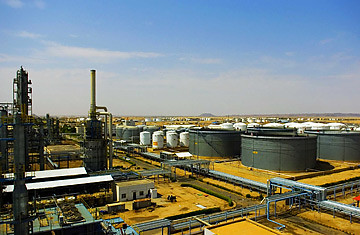
Sudan oil refinery where the newly-emerging oil-rich central African state has been under fire from U.S. imperialism for years. The leadership of the country is being hounded by the ICC which it is not a party to the Rome Statute., a photo by Pan-African News Wire File Photos on Flickr.
February 16, 2012 7:10 pm
Fears rise over Sudan oil stalemate
By Katrina Manson in Juba and Javier Blas in London
Financial Times
South Sudan is unlikely to produce crude oil for several months, even if a deadlock over oil revenues between Africa’s newly independent nation and its northern neighbour is resolved, according to oil industry consensus.
The fear of a long-lasting disruption, which is contributing to rising global oil prices, comes despite the assurance by Juba, the capital, that it could restart production within 48 hours, should there be an agreement with Khartoum.
South Sudan, which won its independence last year, was until last month pumping about 260,000 barrels a day of low sulphur crude oil, which was sought after by refiners in China and elsewhere in Asia, according to the International Energy Agency. But Juba ordered a complete shutdown due to a disagreement with Sudan in late January.
The IEA, the western countries’ oil watchdog, believes that South Sudan will not recover its pre-crisis oil output level at least until the end of the year. Moreover, it believes that given the animosity between Juba and Khartoum, Sudan’s capital, production “will remain at risk at least for the remainder of the year”.
The negotiations between Juba and Khartoum about pipeline transit fees broke off earlier this week amid mutual recriminations.
Pagan Amum, lead negotiator for South Sudan, accused Sudan of stealing its country’s oil. “There is no way we can export our oil through Sudan,” he said. Instead, Juba is proposing alternative pipelines through Kenya and Djibouti, which experts say would take at least two years to build at a cost of several billion dollars.
Khartoum is asking to be paid $36 a barrel for multiple fees, including transit, transportation, processing and marine terminal usage. South Sudan wants to pay a transit fee of $0.63 and $0.69 for each of two pipelines, along with third-party fees of between $5.50-$7.40 per barrel. Moreover, South Sudan is accusing its northern neighbour of stealing up to 6m barrels of oil, worth nearly $650m at current prices.
Oil is an economic lifeline for both countries, among the poorest in Africa.
The wide gulf between the two former warring parties means that a deal is unlikely soon. Moreover, oil executives say that restoring production would not be easy due to the special characteristics of South Sudanese crude, which industry experts say is far more viscose and waxy than average crude and easily clogs pipelines and wells if it stops flowing.
Moreover, Juba has filled the 1,600km-long pipeline linking its oilfields with the export terminal of Port Sudan with water to avoid a major clog. The water, mixed with oil, would need to be treated before it could be discharged, experts said.
“It would take at least three months and would cost around $300m,” said a senior oil trader deeply involved in the South Sudanese’s industry, who requested anonymity to avoid hurting his commercial relationship with Juba.
The fear of a long stoppage is widely shared in the industry – and among political analysts. Philippe de Pontet, director for Africa at political consultancy Eurasia Group, said that the stalemate could keep the country’s oil off the market “well into the second quarter, factoring in additional weeks for pipeline repair.”
CNPC, the Chinese oil company that runs several oilfields in South Sudan, complained to some of the country’s lawmakers that the pace and manner of the shutdown had imperilled oil plant facilities and the pipeline.
But Paul Adong, chief executive of Nilepet, South Sudan’s national oil company, who oversaw the shutdown, insisted that the oil companies that operate the fields – which include, among others, CNPC and Sinopec of China, Petronas of Malaysia, and the Oil and Natural Gas Corporation of India – have not complained about the shutdown.
“The oil companies are happy. I have not received any technical argument saying there is something wrong with the wells or the pipeline,” he said,
“I could do it [restart production] in 36 hours, but I would do it in 48 hours just to make sure I don’t get pressure build up in my pipes. Anyone who says it costs $300m either doesn’t understand or has another reason for saying so.”
A report about the shutdown by the South Sudanese parliament, following a fact-finding mission to the oilfields, dated February 4 and obtained by the Financial Times, said there was no damage to facilities or to the environment.
No comments:
Post a Comment